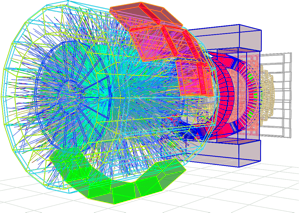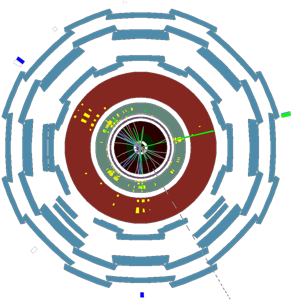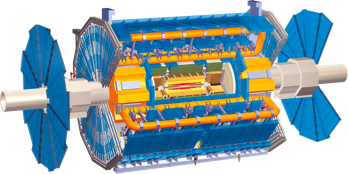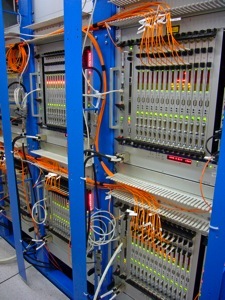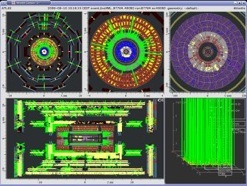The ALICE experiment will probe the mysteries surrounding the structure of matter and the nature of the strong force. In particular, we will create and explore the first instants of the Universe, a few microseconds after the Big Bang when a primordial state of matter, the Quark-Gluon Plasma, is thought to have existed.





At Birmingham, we make major contributions to the ATLAS experiment which will study proton-proton collisions at the LHC. Together with our partner institutes, we are responsible for the design, construction, commissioning and operation of the level-1 calorimeter trigger system which uses fast electronics to provide the essential first level of triggering of the ATLAS detector on electrons, photons, taus, hadronic jets and the possible presence of unidentified particles (via missing energy).

At the School of Physics and Astronomy, we investigate and search for the smallest constituents of the atom and make precise measurements of quarks and leptons. We are heavily involved in the ATLAS and ALICE experiments at the Large Hadron Collider (LHC) at CERN. At the LHC, particles are accelerated towards one another at near light speed. The high energy collisions produce massive particles including the Z boson and the top quark. These experiments will allow us to find out whether supersymmetry, extra space-time dimensions or dark matter are involved when the symmetry of the Standard Model is broken.
The LHC experiments will generate about 15 PB (petabytes) of data annually. That’s enough to fill more than 500000 30GB iPods with 3 billion songs, 4 billion photos or more than 2000 years of video! No single institute is capable of providing the required computing and storage capacities. Birmingham, through its involvement in the GridPP collaboration, is contributing to the development of the world-wide grid which pools together resources of participating institutes worldwide and gives scientists access to resources levels never before available. In addition to contributing computing resources, Birmingham is actively involved in the development and maintenance of the GANGA job management tool which makes the use of the grid quick and easy allowing physicists to concentrate on their analysis. We have established a strong local programme of Grid-based computing in direct support of our experimental activities.
Atlantis is an event display for the ATLAS experiment. It facilitates the visual investigation and understanding of the physics of complete events. It is also a useful tool to help develop algorithms, facilitate debugging and produce images and animations for public consumption. At Birmingham, we have a team of researchers who contribution significantly to the code development of Atlantis. An important contribution was the development of a way to include information retrieved from the ATLAS trigger in Atlantis.
A large Atlantis event display is projected
in the ATLAS control room (see live pictures).


We have excellent clean room facilities and highly skilled staff working locally on the design, construction and testing of key components (e.g. readout hybrids) and software for the ALICE and ATLAS experiments. We are specialists in the design and production of electronic trigger systems used to select the collisions to be recorded. At the LHC, proton bunches are expected to collide at a rate of a thousand million every second. As we can only record and study a few hundred collisions every second, the trigger plays a critical role by only selecting the most interesting ones.
Crates of Cluster Processor Modules (CPM)
Many staff and students in the Particle Physics group have important roles on the LHC experiments.
For more information, please do not hesitate to contact:
The School of Physics and Astronomy has a comprehensive selection of undergraduate physics courses (including Physics with Particle Physics and Cosmology) and an equally diverse range of postgraduate courses (MSc, PGDip/PGCert and PhD) that are geared towards equipping a new generation of young physicists with the discipline, skills and knowledge to perform increasingly complex and demanding scientific endeavours.

Studying at the University of Birmingham

Head of Particle Physics group and member of ATLAS collaboration
UK spokesman for the ALICE experiment and Head of the Birmingham ALICE group
ATLAS Deputy Physics Coordinator and Head of the Birmingham ATLAS group


...the moment has arrived.
“Big Bang experiment starts well” - BBC News
Join us for The LHC first beam on 10th September 2008.




We are the only UK institute involved in the programme of heavy ion collisions studied by the ALICE experiment. The Birmingham team built and currently operate the ALICE central trigger processor which provides level-0, level-1 and level-2 triggers for ALICE.
Hits in the ALICE pixel detector!
Students visiting the University of Birmingham start off their academic year by sharing a moment in history!
